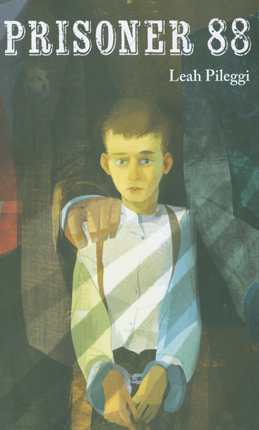| Prisoner 88 Author: Pileggi, Leah | ||
| Price: $6.50 | ||
Summary:
In 1885, ten-year-old Jake is sent to prison for killing a man who threatened his father, and struggles to survive the harsh realities of prison life in the Idaho Territory.![]() Download a Teacher's Guide
Download a Teacher's Guide
| Accelerated Reader Information: Interest Level: MG Reading Level: 3.90 Points: 4.0 Quiz: 159661 | Reading Counts Information: Interest Level: 6-8 Reading Level: 3.50 Points: 8.0 Quiz: 62351 | |
Reviews:
Kirkus Reviews (07/01/13)
School Library Journal (00/11/13)
Booklist (10/15/13)
The Bulletin of the Center for Children's Books (00/07/13)
The Hornbook (00/09/13)
Full Text Reviews:
Bulletin for the Center... - 07/01/2013 Ten-year-old Jake Evans has just received a five-year sentence for manslaughter; according to the justice system in the 1885 Idaho Territory, he’s old enough to know right from wrong, and killing a man, even in defense of his father, is certainly the latter. Jake’s first train and stagecoach rides en route to the penitentiary open his eyes to the world outside of his experience with a neglectful and indifferent father, and the full plates of food slipped under the woven metal bands of his door are more delicious and nourishing than anything he’s ever encountered. The warden and guards are at a bit of a loss on how to treat so young a convict, and as they bend rules and make up protocols to serve his unique circumstances, Jake’s life improves considerably in the aftermath of his conviction. Idaho Territorial Penitentiary is no bed of roses, though: there are hardened criminals who would like to take Jake down just for the grim pleasure of it, and Jake is drawn into the turmoil of an jailbreak attempt, in which one of his advocates is killed. Pileggi closes with a note on ten-year-old James Oscar Baker, whose trial and incarceration inspired her to create a fictional backstory for the true episode. Recommend this high interest quick pick to fans of Western fiction, and especially to students who sullenly foot-drag their way through historical fiction assignments. EB - Copyright 2013 The Board of Trustees of the University of Illinois.
Booklist - 10/15/2013 Could a 10-year-old really be in a penitentiary? Pileggi bases her debut on an actual case in which a boy in 1885 served time in the Idaho Territorial Penitentiary. Young prisoner Jake narrates his story with a lively, winsome voice that will pull readers in and grab their sympathies, particularly as details of his bungled trial are revealed. He nicknames the other prisoners and staff and portrays daily life with a wry wit and beguiling innocence, all the while honing his inner core and survival instinct. In some ways, prison is sheltering for Jake, who had been abandoned by his father; he slowly learns to read, becomes invested in his work tending hogs, and experiences caring adults for the first time. Best of all, he can count on food: “They feed us every day? I couldn’t hardly believe that.” Eventually the hand of justice prevails, and Jake makes good without too many quick fixes. His story and spirit should linger in readers’ hearts. - Copyright 2013 Booklist.
School Library Journal - 11/01/2013 Gr 5–8—Pileggi was taking a tour of the Old Idaho Penitentiary in Boise, in 1970, when she learned that its youngest prisoner was a 10-year-old convicted of manslaughter and sentenced to five years in the late 1800s. Intrigued, she read newspaper articles and trial transcripts, writing the imagined day-to-day life of this boy. The good and the bad are told through Jake's eyes in a straightforward manner. "Bricks on the floor, three stone walls, and that too-tight-wove metal door. A cage." Yet he thinks he's dreaming when his first meal comes-beef, potatoes, beans, cabbage, and good bread-rarely has he had such good food and certainly not three times a day. Jake is befriended by fellow prisoners, a guard, and the warden; he learns to read and gets a job at a nearby farm with a family to whom he grows attached. Life is fairly mundane until the day a few convicts plan to escape and Jake is nearly killed. The boy comes to terms with his crime and his father's abandonment and is released after a year to a foster family. More than anything, he wants to stay with the family that he's been working for, but things aren't always the way he wants them to be. His voice is real, and his language reflects the stereotypes of the day. For example, a Chinese character is referred to as "the China Man." Large type and a swiftly moving story will engage readers.—Amy Cheney, Alameda County Library, San Leandro, CA - Copyright 2013 Publishers Weekly, Library Journal and/or School Library Journal used with permission.



